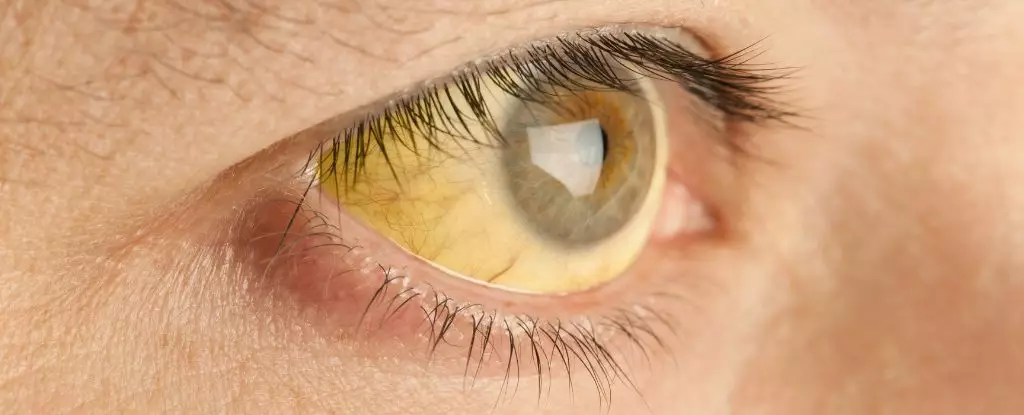In a world where health is often thought of as a binary state—healthy or unhealthy—jaundice stands out as an alarming anomaly. Traditionally, it is an alarming yellowing of the skin and eyes, signaling a disruption in liver function and potentially serious health consequences. The prevailing notion around jaundice has been detrimental, with high bilirubin levels often linked to dire outcomes like liver damage or brain injury. However, recent research turns this conventional wisdom on its head, revealing that this same compound, bilirubin, may serve a protective role against one of humanity’s most persistent threats: malaria.
Rather than viewing bilirubin as merely a leftover waste product of the body, researchers are beginning to recognize its complex role in defense against infectious diseases. Johns Hopkins molecular biologist Bindu Paul noted that the study disrupts the damaging narrative surrounding bilirubin and demonstrates how it may be a vital ally, not just in fighting malaria, but also in forestalling neurodegenerative diseases. This new perspective could potentially redefine how we address the inflammation and distress resulting from diseases that ravage our liver and blood.
A Global Emergency: Malaria’s Scope
Malaria is not just an old-world affliction; it is a pressing global emergency that infects over 260 million people annually, predominantly in tropical and subtropical regions. The statistics are sobering: approximately 600,000 lives lost to this disease each year. The Anopheles mosquito may be small, but it is a formidable vector for the parasitic invasion of the human bloodstream, bringing the Plasmodium falciparum protozoan into contact with our very core—our red blood cells.
This parasite is not merely a nuisance; it systematically decimates red blood cells, releasing toxic iron-rich heme that contributes to the disease’s severity. The situation escalates when one considers that the immunity landscape against malaria has been uneven, heavily favoring those with certain biological advantages. Recent research appears to unveil newfound hope in an unexpected mechanism—the very jaundice that many dread could serve as a bulwark against this age-old scourge.
The Role of Bilirubin: More Than a Byproduct
The studies highlight a remarkable connection: participants infected with malaria who showed no symptoms had tenfold higher levels of unconjugated bilirubin compared to those who did exhibit symptoms. This correlation suggests that bilirubin could be performing a heroic role by alleviating the effects of malaria. In laboratory studies involving mice, the evidence of bilirubin’s protective mechanism becomes starkly clear. Mice genetically engineered to lack bilirubin succumbed quickly to the infectious agent, while their regular counterparts thrived in the face of the same threat.
The significance is profound. Within red blood cells, bilirubin’s accumulation actively inhibits the growth and survival of the malaria parasite, disrupting its critical organelles responsible for digesting nutrients. It’s astonishing to think that a compound long relegated to the sidelines of biological importance may stand as a key player in malaria resistance. The implications of this research could extend well beyond malaria, shaking the foundations of how we think about bilirubin’s relationship to health and disease.
The Evolutionary Advantage: A Double-Edged Sword
The study argues that bilirubin’s protective capabilities are not merely incidental but rather part of an evolutionarily conserved defense mechanism. However, there’s an ethical and biological trade-off at play. While bilirubin can provide a shield against malaria, it also increases the risk of neonatal jaundice—a condition that carries its own set of dangers, particularly to developing brains.
This balance between protection and vulnerability adds a layer of complexity to our understanding of biological functions. As researchers delve deeper into this duality, we should also consider the societal implications of such discoveries. Understanding the intricate biological dance of bilirubin may be crucial for enhancing treatments for malaria, and it underscores the necessity for a more nuanced view of health—that not every biological response we observe is strictly detrimental or beneficial.
The potential to harness bilirubin in the fight against malaria poses questions to our healthcare practices. Instead of viewing jaundice as a simple pathology that requires treatment, we might need to contemplate its broader roles in the human body. Integrating this knowledge into medical strategies could transform the landscape of malaria treatment, offering hope for millions suffering from this dire disease.


Leave a Reply